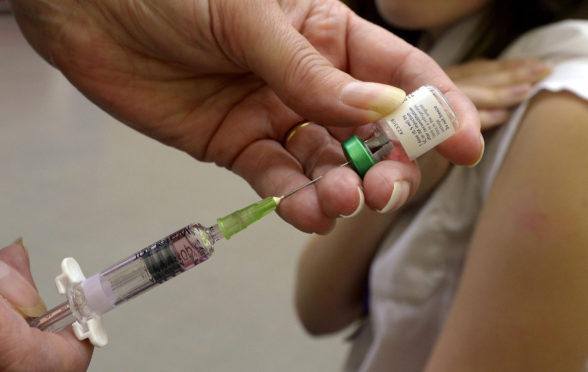
More than half a million children in the UK have not been vaccinated against measles, new figures covering an eight-year period show.
The charity Unicef warned that increasing numbers of youngsters are being left unprotected against measles, which can cause disability and death.
Inaccurate and misleading anti-vaccination messages on social media are thought to be one reason why vaccination rates are plummeting.
Unicef’s analysis shows that an estimated 169 million children around the world missed out on the first dose of the measles vaccine between 2010 and 2017 – an average of 21.1 million a year.
A list of 10 high-income countries shows the US has the highest number of children missing out on their first dose of the vaccine.
Between 2010 and 2017, some 2,593,000 youngsters in the US did not have their first dose of the vaccine.
The second most affected country was France, with 608,000 unvaccinated children over the same time period, followed by the UK, with 527,000.
Other countries including Argentina, Italy, Japan, Canada, Germany and Australia also made the top 10.
Unicef executive director Henrietta Fore said: “The measles virus will always find unvaccinated children.
“If we are serious about averting the spread of this dangerous but preventable disease, we need to vaccinate every child, in rich and poor countries alike.”
In the first three months of 2019, more than 110,000 measles cases were reported worldwide – up almost 300% on the same period the year before.
An estimated 110,000 people, most of them children, died from measles in 2017, a 22% rise on the previous year.
Children need two doses of the vaccine for protection, with the World Health Organisation (WHO) recommending 95% coverage to achieve herd immunity, which offers protection against the disease spreading in the community.
In the UK in 2017, there were 259 measles cases in England, rising to 966 in 2018.
In 2016 and 2017, uptake of the first dose of the MMR vaccine in five-year-olds in the UK exceeded 95% for the first time.
However, two doses of MMR vaccine are required to ensure full protection from measles.
Uptake of the second dose of MMR in five-year-old children is 88% – well below the 95% WHO target.
Figures from October to December 2018 show nine out of 10 children received their first dose by age two, rising to 95% at age five.
By age five, 87% had had their second dose, the quarterly figures showed.
Mary Ramsay, Public Health England’s head of immunisations, said: “The UK achieved WHO measles elimination status in 2017, so the overall risk of measles to the UK population is low.
“However due to ongoing measles outbreaks in Europe, we will continue to see cases, particularly in unimmunised individuals.
“This could lead to some spread in communities with low MMR coverage and in age groups with very close mixing.
“Measles can be extremely serious, so make sure you and your family are protected.”
Globally, 85% of children received their first dose in 2017 and 67% got the second dose.
Unicef said the rates reflected “lack of access, poor health systems, complacency, and in some cases fear or scepticism about vaccines”.
Simon Stevens, NHS England chief executive, said: “Getting yourself and your children vaccinated against killer diseases is essential to staying healthy, and vaccine rejection is a serious and growing public health timebomb.
“With measles cases almost quadrupling in England in just one year, it is grossly irresponsible for anybody to spread scare stories about vaccines, and social media firms should have a zero tolerance approach towards this dangerous content.”

Enjoy the convenience of having The Sunday Post delivered as a digital ePaper straight to your smartphone, tablet or computer.
Subscribe for only £5.49 a month and enjoy all the benefits of the printed paper as a digital replica.
Subscribe